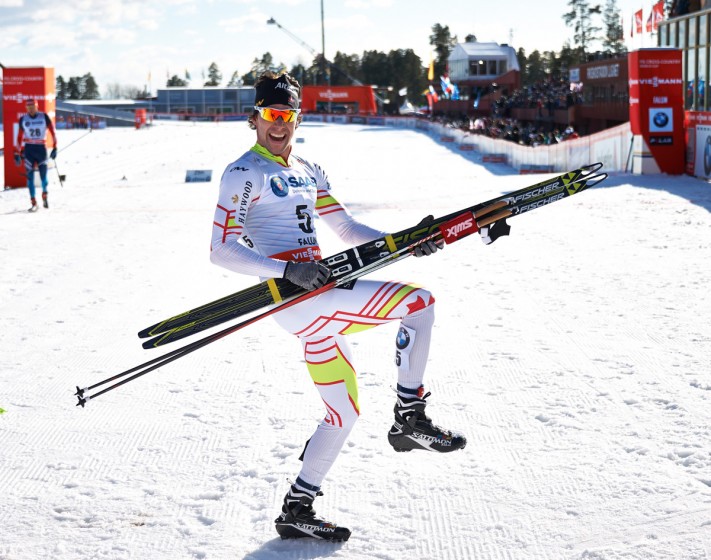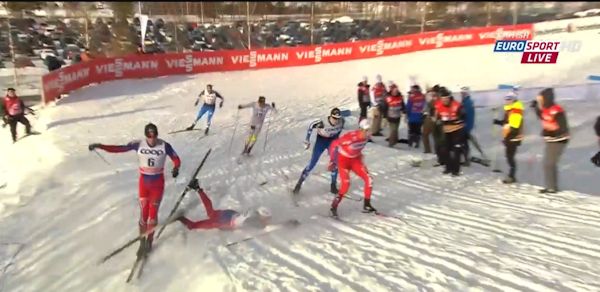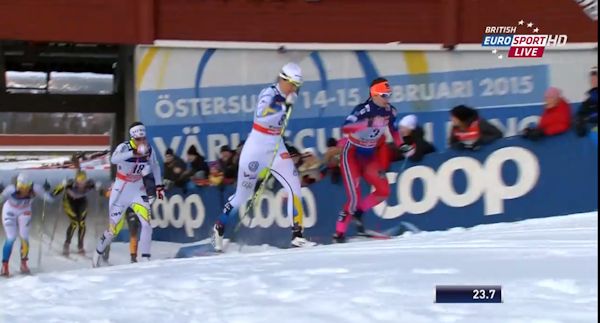
When it comes to the World Cup, competitor’s personal expectations aren’t always met. But for Alex Harvey it was a good thing that Saturday’s 1.2-kilometer classic sprint didn’t go the way he thought it would. After examining the course, Harvey didn’t see much potential for a top result. It was a short loop that featured steep hills, and the 26-year-old Canadian had completed an altitude camp in Italy just days before.
However, as the men’s final entered the finish Harvey wasn’t an onlooker. Instead, he was in the thick of the action with 100 meters to go, double poling to fight for his best non-stage World Cup result of the 2014/2015 season.
Harvey finished second to Finn Hågen Krogh of Norway, who skied to victory with a time of 2:25.28. Harvey skied across the line in a close second, 0.47 seconds back. Timo Andre Bakken, also of Norway, placed third after winning the qualification round earlier in the day. He finished 1.41 seconds back from Krogh.
In fourth was Norwegian Sondre Turvoll Fossli, who competed in Östersund after winning the classic sprint at the U23 World Championships in Kazakhstan earlier this month. He was 4.27 seconds back from the win. Matias Strandvall (+5.86) of Finland and Alexander Panzhinskiy (+9.30) of Russia finished fifth and sixth.
Krogh skied a smart and technical race throughout the day. He placed himself behind the leaders in the beginning of both the quarterfinal and semifinal, yet surged ahead in the final meters of the 1.2 k course. In the final he did the same, but roughly halfway through the race he attempted to gap the field. While his fellow podium finishers were able to keep contact, it was a strategy that worked, as Krogh stretched out the pack and cruised across the line in first.
“It is great to have another win this season. It was really challenging today and it was important to race smart and stay out of trouble. I always tried to stay near the front and in the end it worked for me,” Krogh told the International Ski Federation (FIS) after his win.
Krogh is not officially slated to start at the 2015 World Championships set to begin next week, despite being a member of Norway’s team for the event. He explained that the result was a step towards earning a coveted Norwegian spot at the starting line in Falun. He also has a case for a start position in his world ranking. Krogh is now the World Cup sprint leader after Saturday’s win, toppling Italian sprinter Federico Pellegrino who finished Saturday’s race in 10th.
Unlike Krogh, Harvey had a roller-coaster ride to his best World Cup result of the season. Qualifying in 26th position, Harvey entered a stacked quarterfinal featuring Pellegrino and Norwegians Ola Vigen Hattestad and Pål Golberg. Harvey spent much of the race near the back of the pack, at one point falling to fifth in the second half of the race.

With Hattestad and Golberg in the lead, the skiers rounded a sharp corner before climbing the final hill. It was there the Norwegians fell victim to a race-ending crash as Hattestad slid into Golberg and the two flew off the course. With the leaders out, Pellegrino and Harvey took advantage of the situation to cruise into first and second.
“I still think I would have snuck into a lucky loser spot because our heat was really fast,” Harvey speculated in a post-race interview. “I was second but I think if those guys had stayed on their skis I would be lucky loser.”
Harvey once again started near the back of the pack in the semifinal, but surged ahead in the second half of the course to take second behind Fossli and ensure his advancement to the final. He explained that his skis in the quarterfinal had too much kick but that they were perfect by the time he started the semifinal.
“In the second lap I knew that guys would start fading a bit, so I was able to make my way to the front,” Harvey said of the heat.
In the final, Harvey had a slow start but inched forward through the pack over the first lap. By the time Krogh attempted to break away from the six men, Harvey was the first to respond, trailing the Norwegian closely and breaking even with him throughout much of the remaining meters.
“I think physiologically I’m not as fast as the pure sprinters. I’m not fast enough on the first lap, but on the second lap the pure sprinters get a little tired and I stay the same,” Harvey explained of his ability come from behind in the final.
Heading into the finish, Harvey lost a little ground to Krogh and was unable to match the Norwegian’s speed in the final 100 meters. Although the win was just out of sight, Harvey maintained his speed to outlast a late charge by Bakken.
“I was close to being perfect but just missing a little at the end,” Harvey said of the final.
Bakken, who skied in his first-ever World Cup final and notched a first career podium, said that the course favored his strengths and that the roughly 10,000 person crowd in Östersund was impressive because of their enthusiasm.
“I felt this was a good course for me and I am happy to have my first World Cup podium. I am Norwegian Champion this year but I have not much success on World Cup so this is a great feeling,” Bakken said to FIS.
Valjas 13th, Jones 21st for Canada
Harvey’s teammate Lenny Valjas was the only other Canadian male to qualify for Saturday’s heats in 18th position. In the quarterfinals, he spent much of the race in last position but was able to take advantage of a crash by Sweden’s Calle Halfvarsson to advance through the pack and take third. Valjas was only 0.05 seconds away from a lucky loser position and ultimately finished his day in 13th.
Jess Cockney was the final Canadian male, placing 75th.

For the women, Perianne Jones raced to 18th in qualification. She skied to fifth in her quarterfinal to claim 21st overall.
“My qualifier was great – for sure the strongest one this year by far,” Jones wrote in an email. “I had some great skis, and executed everything the way I wanted to. I maybe used a little too much energy on the first lap, but overall I was really happy with it.”
Jones said that while she was in good position early on in her quarterfinal, she was unable to match the leader’s speed and lost ground.
“I wouldn’t have done anything differently, I need to be able to ski with those girls for the entire race, not just the first half,” she wrote.
In her first World Cup start, teammate Olivia Bouffard-Nesbitt was the only other Canadian woman to race Saturday. She finished 55th overall.
Harvey will not participate in Sunday’s 15 k freestyle individual start. He explained that while he wanted to use the race as training, his coaches’ plan said otherwise. As he and the Canadian squad shift their focus to World Championships, which start Feb. 18th, Harvey said that Saturday’s result is a boost before the year’s most anticipated races.
“It gives me a lot of confidence. I think the speed is there for sure and I know the endurance is there too,” he explained.
According to Harvey, the key to a successful championships will be to stay healthy and stick to his planned routine.
“I need to stay healthy. That’s always number one,” he said. “It’s routine now. I’ve been to a lot of championships, even from my junior days. I know the drill and how to prepare. So I’ll just stick to the plan and trust the plan and trust the shape.”
Lander Karath
Lander Karath is FasterSkier's Associate Editor from Bozeman, Montana and a Bridger Ski Foundation alumnus. Between his studies at Middlebury College in Vermont, he is an outdoor enthusiast and a political junkie.



